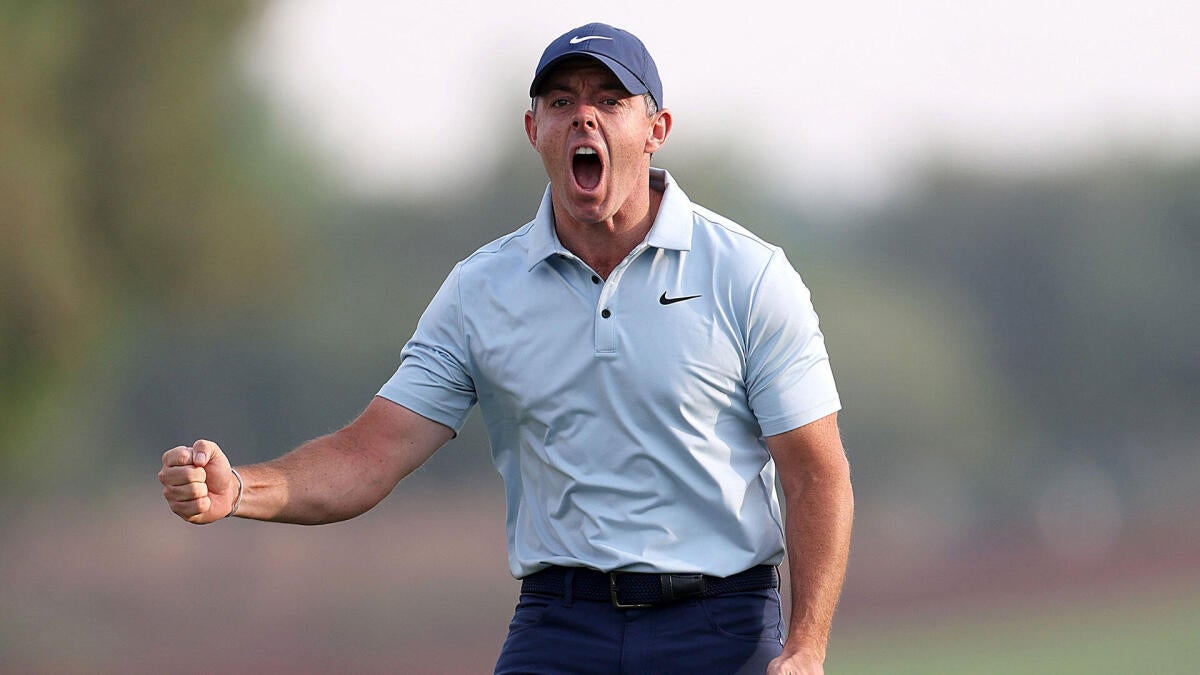When Rory McIlroy walked in his eagle putt on the 72nd hole of the DP World Tour Championship to force a playoff against Matt Fitzpatrick on Sunday, the Northern Irishman had already won. The world No. 2 locked up his fourth straight and seventh overall Race to Dubai season-long title, jumping his European golf hero, Seve Ballesteros, for the second most all-time.
Inching closer to Colin Montgomerie, who possesses the most ever with eight, McIlroy had already experienced the season of all seasons amid a career chock full of accomplishments. But there was the 36-year-old grand slam champion, walking backwards as his ball tracked and tracked and tracked into the middle and bottom of the cup.
His clenched right fist flew into the air as he yelled, “Come on!” A second fist pump was thrown even higher, and a third reaction required the use of his entire body. In that moment, without a sliver of doubt, any onlooker from any corner of the planet could tell: Rory McIlroy cares.
“I said this numerous times this week. I could have came in here these last two weeks of the year and relaxed a little bit and taken it easy. But … I’m a proud person, and I take pride in my performances on the golf course, and I want to give a really good account of myself these two weeks, and I feel like I’ve done that,” McIlroy said after completing the season-finale.
Caring is not something usually celebrated because it is expected from professional athletes. After all, this is their job, their craft, what they spend day after day trying to perfect. We believe they are incredibly privileged to do what they want to be doing.
But in the slog of a long golf calendar that starts in early January and ends … only a couple of weeks before the so-called “season of giving,” the level of care inevitably fluctuates.
Perhaps Tiger Woods was the exception to this rule, but no one is immune — not the rookie trying to keep his card in the coming weeks, the journeyman playing professional golf since the financial crisis nor the masses of athletes in between.
Now, consider McIlroy has already accomplished nearly everything the game has to offer, and his ability to care this deep into a season — this deep into a career — is even more astounding.
It is this context that makes it glaring there was no mistake that Rory McIlroy won where Rory McIlroy won in 2025 — Pebble Beach Golf Links, TPC Sawgrass, Augusta National Golf Club and the K Club — respectively, one of the most historic venues in the game (a “cathedral of golf,” he called it at the time), the PGA Tour’s flagship event, the major championship he so desperately desired (becoming the sixth grand slam champion in history) and the site of his first Irish Open win.
There were other tournaments he truly cared about this season, of course: this closing stretch on the DP World Tour playoffs, The Open at Royal Portrush in his home country, other national opens and the Ryder Cup at Bethpage Black.
McIlroy showed in these performances that his greatest superpower is neither his prodigious driving ability, nippy pitch shots nor his timely putting (which soared to new heights in 2025).
It’s his level of care.
For someone who has cared about so much in the world of golf over the last half-decade, McIlroy’s ability to sharpen his focus on what he cares about matters. It matters to him. It matters to fans. It matters to the game and its history. And it matters to those he competes against, because when Rory McIlroy shows up at a golf tournament with his gauge reading “full,” not only does Rory know how much he cares, so will everyone else.

